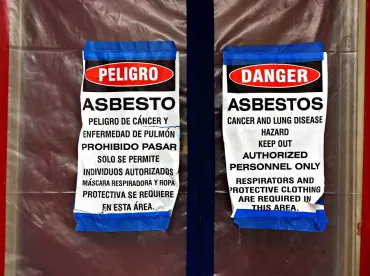On January 31, 2019, the U.S. Environmental Protection Agency (EPA) was petitioned by the Attorneys General of 14 states (Massachusetts, Pennsylvania, California, Connecticut, Hawaii, Maine, Maryland, Minnesota, New Jersey, New York, Oregon, Rhode Island, Vermont, and Washington) and the District of Columbia under Toxic Substances Control Act (TSCA) Section 21(a) to issue an asbestos reporting rule to require reporting under TSCA Section 8(a) of information necessary for EPA to administer TSCA as to the manufacture (including importation), processing, distribution in commerce, use, and disposal of asbestos. Specifically, the petition states that the Attorneys General are petitioning EPA’s Administrator to:
- [I]nitiate a rulemaking and issue a new asbestos reporting rule to: (i) eliminate any applicability of the “naturally occurring substance” (NOCS) exemption in the [Chemical Data Reporting (CDR)] for asbestos reporting; (ii) apply the CDR reporting requirements to processors of asbestos, as well as manufacturers, including importers, of the chemical substance; (iii) ensure that the impurities exemption in the CDR does not apply to asbestos; and (iv) require reporting with respect to imported articles that contain asbestos.
In support of their requests in the petition, the Attorneys General state the following:
- NOCS Exemption: “[t]he identified uses of imported raw asbestos represent pathways of exposure that present risks to health and the environment that EPA must consider in conducting its risk evaluation and regulating asbestos, and accordingly EPA should promulgate an asbestos reporting rule to require reporting of such information. Moreover, the required asbestos reporting must capture information with respect to the quantities imported, and these potential exposure pathways so this information can be made available to inform the states’ and the public’s knowledge regarding asbestos exposure risks.”
- Reporting from Processors: “to to enable EPA to carry out its responsibility to impose requirements on processors to eliminate unreasonable risks of injury to health or the environment arising from exposures to asbestos, EPA must promulgate new regulations to apply the reporting requirements of the CDR to processors of asbestos notwithstanding that the current CDR does not expressly require such reporting. Should EPA fail to do so, EPA would be violating TSCA, acting arbitrarily and capriciously, and abusing its discretion in implementing TSCA.”
- Exemptions for “Impurities” and “Articles”: “while the CDR exempts reporting with respect to ‘impurities’ and for chemical substances imported as ‘part of an article,’ neither of these exceptions should be applied to reporting with respect to the presence of asbestos if EPA is to satisfy TSCA’s mandate to prevent unreasonable risks associated with exposures to this highly toxic chemical.”
- Reporting for Asbestos: “EPA must account for the many tons of asbestos that are imported into the U.S., whether as a raw material or processed, to evaluate adequately the current and likely future risks of exposure to asbestos, and must also account for asbestos in consumer products, whether or not the asbestos is intentionally included in those products. These data … are needed for EPA to be able to make informed technically complex decisions regarding the regulation of asbestos. Without these data to rely on, the agency will be unable to meet its obligations under TSCA to make its decisions based on the weight of the scientific evidence and using the best available science …. Accordingly, EPA must issue an asbestos reporting rule to ensure that the NOCS, the impurities, and the articles exemptions do not apply to asbestos and that processors of asbestos are required to report.”
The petition cites EPA’s denial of a petition submitted by a group of non-governmental organizations (NGO) seeking similar action that the Attorneys General are requesting but does not address the many reasons that EPA denied the first petition. Why the Attorneys General would follow up EPA’s well-reasoned denial with a petition of their own with very similar requests and only marginal additional facts, is unclear. More information on the NGO petition is available in our blog item EPA Denies Section 21 Petition Seeking Increased Asbestos Reporting.




 />i
/>i

